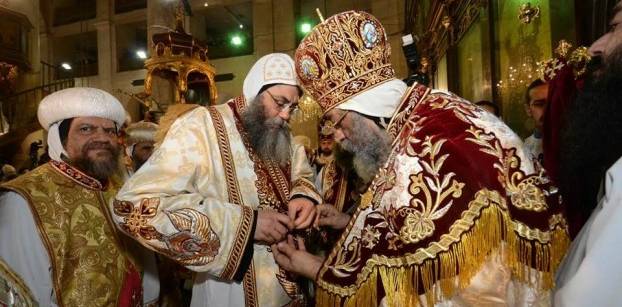Egyptian Church's approach unchanged in face of Minya violence

The ordination ceremony of Archbishop Theodor Antonine (L) as the new Coptic Orthodox Metropolitan Archbishop for Jerusalem and the Near East by Pope Tawadros II, on Sunday, Feb 28, 2016. Handout from Pope Tawadros II's official website
CAIRO, May 27 (Aswat Masriya) - Only five months after Pope Tawadros II was ordained in November 2012 to lead Egypt’s Coptic Orthodox Church, the St. Mark Cathedral, located in Abassiya in the heart of Cairo, was subjected to an unprecedented attack in April 2013.
In a scene that attracted wide local and international resentment, the attack on St. Mark Cathedral took place while a funeral service was being held inside the church for Copts killed earlier in April in sectarian clashes in the village of Khosous, which is located in Egypt’s Qalyubia province.
Violence had erupted in Khosous after Christian children allegedly painted offensive drawings on the wall of an Islamic institute. One Muslim and six Christians were killed.
Yet, the Church only adhered to the moderate approach it has typically adopted over the years. It even asked angry Christian youth to avoid escalation and to exercise self-restraint vis-à-vis the events that took place under Islamist president Mohamed Mursi, who hailed from the Muslim Brotherhood group, and who ruled the country for one year until he was militarily ousted in July 2013 after mass protests against his rule.
“A nation without churches is better than churches without a nation,” Pope Tawadros said in 2014, expressing the Church’s position regarding attacks on churches by Mursi’s supporters following the Islamist president's ouster and in retaliation to the violent dispersal of the pro-Mursi protest camps, known as the Rabaa and Nahda sit-ins, in August 2013.
Tawadros’ approach is not different from that of his predecessor Pope Shenouda. Both consistently called for self-control, not for punishing those who attack Christians.
Against this backdrop, it is not surprising how Tawadros reacted to the recent sectarian events in Egypt’s Minya province where a number of Muslims assaulted Christians and stripped an elderly Christian woman naked.
The attacks occurred on May 20 following rumours that the woman's son allegedly had an affair with a Muslim woman, according to the local church and witnesses.
The Christian man fled the Karam village with his wife and children after he received threats, while his parents filed a complaint on May 19 to security officials reporting those threats, according to a statement released by the local Coptic Orthodox church on Wednesday.
One day later, a group of 300 armed individuals attacked seven houses where Christians reside, looting them and setting them ablaze, causing an estimated loss of EGP 350,000, and stripped the mother naked out on the street, the local church said.
In a statement issued on Thursday, Pope Tawadros called for “closing the door on those trying to utilise the incident to ignite sectarian strife” and said he was closely following up on the issue with political authorities and security officials.
But a segment of young Copts expressed resentment over the Church’s response, which they saw as late and "weak", and criticised a number of its leaders in “comments” they posted on the Facebook page of the Church’s spokesman.
Rami Kamel, a Coptic activist who heads the Maspero Foundation for Human Rights, told Aswat Masriya that the Church’s statement did not reflect Copts’ anger, nor did it live up to their ambition to hold the perpetrators accountable.
He said that the Church is trying to preserve its political role as one of the state’s institutions, not a spiritual institution.
The spokesman of the Coptic Orthodox Church could not be immediately reached to comment on its stance on Minya’s violence.
Meanwhile, President Abdel Fattah al-Sisi has instructed that state institutions restore order in the village and rebuild damaged property, according to a statement published on Sisi's official Facebook page on Thursday.
Orthodox Copts make up about 10 per cent of Egypt's population and are the Middle East's biggest Christian community.









facebook comments